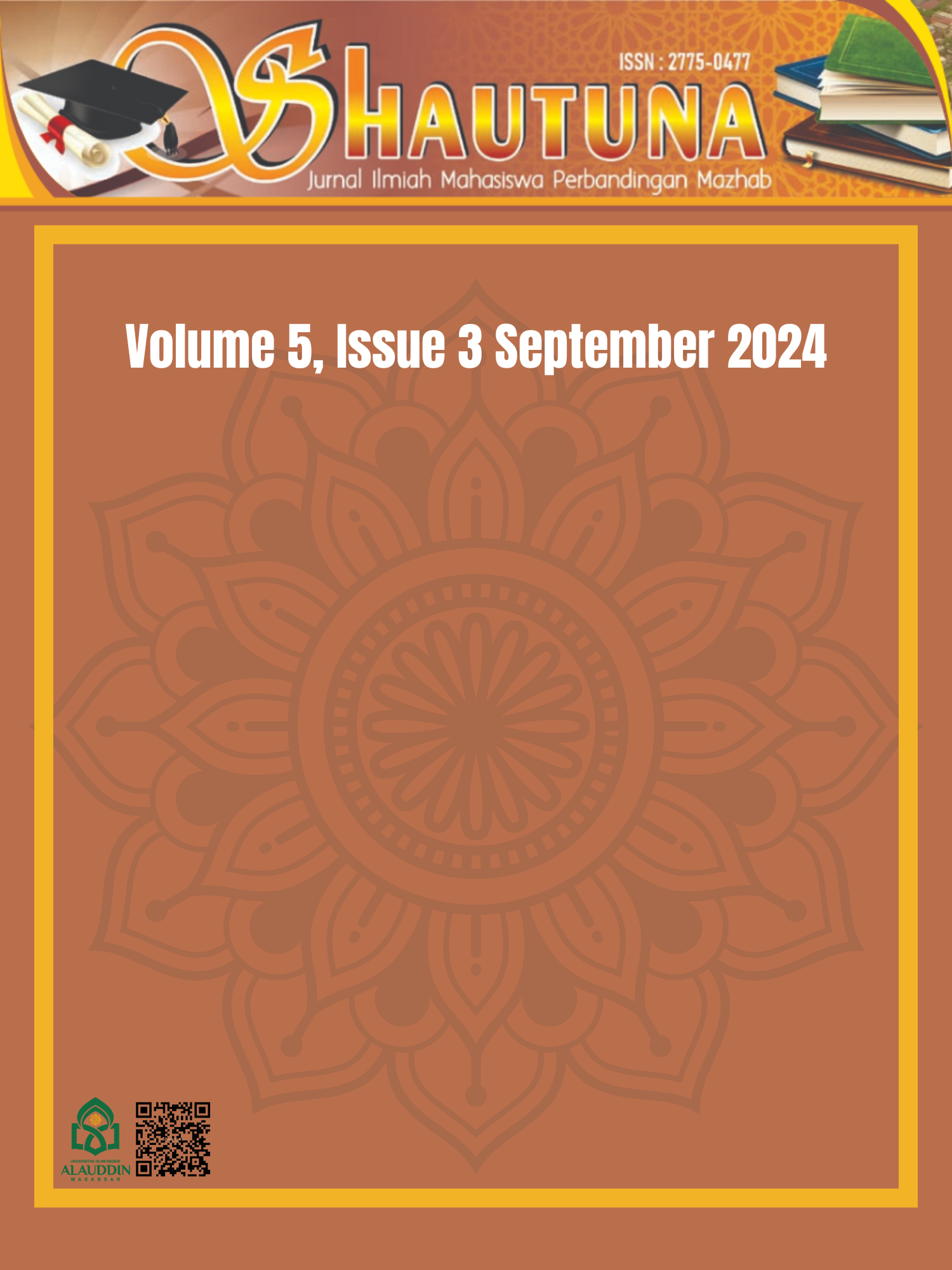Legal Review of the Death Penalty in the Perspective of Human Rights
DOI:
https://doi.org/10.24252/shautuna.v5i3.51942Keywords:
Death Penalty, Human Rights, Criminal LawAbstract
This study aims to analyze the regulation of the death penalty in Indonesia and its implications for human rights. The method used in this study is library research with a normative approach and legal documentation. Regulations regarding the death penalty in Indonesia are regulated in the Criminal Code (KUHP) and in other sectoral laws. Based on statistical data and studies by criminologists, the death penalty is considered ineffective in reducing crime rates, because it does not provide a significant deterrent effect. On the other hand, the existence of the death penalty is considered contrary to the principles of human rights, especially the right to life. The right to life is a fundamental right guaranteed in various human rights instruments, such as the Universal Declaration of Human Rights, the International Covenant on Civil and Political Rights, the American Convention on Human Rights, Law Number 39 of 1999 on Human Rights, and the Charter of Fundamental Rights of the European Union. At the national level, the right to life is also constitutionally guaranteed in Article 28I paragraph (1) of the 1945 Constitution. In the perspective of Islamic law, the death penalty (qishash) was known before the advent of Islam and underwent reforms in its application in accordance with the principles of justice and protection of the soul. Therefore, the discourse on the sustainability of the death penalty in Indonesia needs to consider a comprehensive juridical, ethical, and theological approach.
References
Badaru, Baharuddin. “Tinjauan Yuridis Terhadap Problematik Penerapan Pidana Mati dari Perspektif Hak Asasi Manusia.” Unes Journal of Swara Justisia 7, no. 3 (2023): 881–88. https://doi.org/10.31933/ujsj.v7i3.402.
Dewi, Ni Komang Ratih Kumala. “Keberadaan Pidana Mati dalam Kitab Undang-Undang Hukum Pidana (KUHP).” Jurnal Komunikasi Hukum (JKH) 6, no. 1 (2020): 104–14. https://doi.org/10.23887/jkh.v6i1.23444.
Faizah, Niswatul. “Konsep Wali Mujbir Imam Syafi’i dalam Perpektif Ham (Human Right).” Jurnal Pro Justice: Kajian Hukum dan Sosial 1, no. 2 (2019): 12–24. https://ejournal.billfath.ac.id/index.php/projustice/article/view/50.
Fitria, Yanna. “Implementasi Ekstradisi Oleh Pemerintah Indonesia Berdasarkan Beberapa Kasus Pada Tahun 2010 Sampai 2020.” Universitas Islam Riau, 2021. http://repository.uir.ac.id/id/eprint/14483.
Gunaratna, Rohan. “Strategic Counter-Terrorism.” Counter Terrorist Trends and Analyses 9, no. 6 (2017): 1–5.
Henry, BSSOM, dan Kristian Siburian. “Penerapan Hukuman Mati Menurut Hukum Positif di Indonesia ditinjau dari Perspektif Hak Asasi Manusia.” Jurnal Kewarganegaraan 7, no. 1 (2023).
Juwana, Hikmahanto. “Kewajiban Negara dalam Proses Ratifikasi Perjanjian Internasional: Memastikan Keselarasan dengan Konstitusi dan Mentransformasikan ke Hukum Nasional.” Undang: Jurnal Hukum 2, no. 1 (2019): 1–32. https://doi.org/10.22437/ujh.2.1.1-32.
Kambu, Wari Martha. “Tinjauan Yuridis Tentang Hak Asasi Manusia Berdasarkan Pasal 28d Ayat 3 Undang-Undang Dasar 1945.” Lex Et Societatis 9, no. 1 (2021): 137–45. https://doi.org/10.35796/les.v9i1.32170.
Konstitusi, Mahkamah. “Putusan Mahkamah Konstitusi Republik Indonesia Nomor 2-3/PUU-V/2007,” 2007, 1–471.
Kosasih, Ahmad. HAM dalam Perspektif Islam. Jakarta: Salemba Diniyah, 2003.
Kusumaatmadja, Mochtar. Pengantar Hukum Internasional; Pengertian, Batasan, dan Istilah Hukum Internasional. Bandung: Alumni, 2003.
Lay, Todung Mulya Lubis dan Alexander. Kontroversi Hukuman Mati. Jakarta: Kompas Press, 2009.
Manoppo, Gabrielle Aldy. “Analisis Pidana Mati Berdasarkan Pasal 100 Undang-Undang Nomor 1 Tahun 2023 Tentang Kitab Undang-Undang Hukum Pidana.” Lex Administratum 12, no. 1 (2023): 1–12. https://ejournal.unsrat.ac.id/index.php/administratum/article/view/51527.
Maryandi, Yandi. “Hukuman Mati Bagi Terpidana Narkoba Menurut Hukum Positif dan Hukum Pidana Islam.” Tahkim 3, no. 2 (2020): 131–54.
Priyono, Priyono. “Eksistensi Pidana Mati dalam Persfektif KUHP (Studi Kasus Pembunuhan Berencana Disertai Mutilasi Korban Berdasarkan Putusan Mahkamah Agung No. 25 PK/PID/2012).” Jurnal Hukum Media Justitia Nusantara 8, no. 1 (2018): 10–22. https://doi.org/10.30999/mjn.v8i1.662.
Rante, Devi Y, Sufirman Rahman, dan Baharuddin Badaru. “Penerapan Pidana Mati dari Perspektif Hak Asasi Manusia (HAM).” Journal of Lex Generalis (JLG) 3, no. 9 (2022): 1496–1505. https://mail.pasca-umi.ac.id/index.php/jlg/article/view/1081.
Roring, Friska Rosita. “Penerapan Hukuman Mati di Indonesia Dalam Sudut Pandang Pelanggaran Hak Asasi Manusia.” Lex Privatum 11, no. 4 (2023). https://ejournal.unsrat.ac.id/index.php/lexprivatum/article/view/48005.
Rumega, I, dan W Gede. “Hakim Komisaris Dan Miscarriage of Justice Dalam Sistem Peradilan Pidana.” Jurnal Penelitian Hukum De Jure 19, no. 1 (2019): 53–68. https://doi.org/Kegagalan sistem hukum pidana untuk tidak menghukum orang yang tidak bersalah juga pernah terjadi di Indonesia, seperti pada kasus Sengkon dan Karta pada tahun 1974.
Subekti, Nanang, I Gusti Ayu Ketut Rahmi Handayani, dan Arief Hidayat. “Konstitusionalisme Digital di Indonesia: Mengartikulasikan Hak dan Kekuasaan dalam Masyarakat Digital.” Peradaban Journal of Law and Society 2, no. 1 (2023): 1–22. https://doi.org/10.59001/pjls.v2i1.74.
Wongkar, Natania Djesika, Donald A Rumokoy, dan Lendy Siar. “Pelaksanaan Hak Untuk Hidup Berdasarkan Pasal 28a Undang-Undang Dasar Negara Republik Indonesia Tahun 1945.” Lex Administratum 11, no. 3 (2023): 5–15. https://doi.org/10.35796/les.v8i3.29495.
Yuhermansyah, Edi, dan Zaziratul Fariza. “Pidana Mati dalam Undang-Undang Tindak Pidana Korupsi: Kajian Teori Zawajir dan Jawabir.” LEGITIMASI: Jurnal Hukum Pidana Dan Politik Hukum 6, no. 1 (2017): 156–74. https://doi.org/10.22373/legitimasi.v6i1.1848.
Downloads
Published
How to Cite
Issue
Section
License
Copyright (c) 2024 Airlangga Putera, Miftahul Jannah, Hanry Setiawan Nasution

This work is licensed under a Creative Commons Attribution 4.0 International License.









